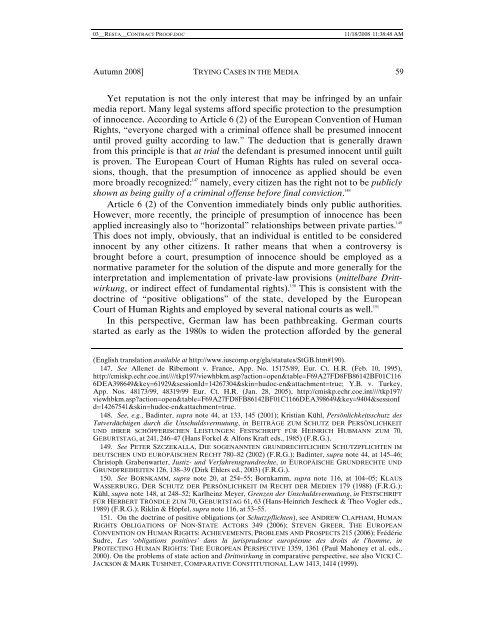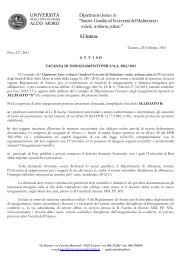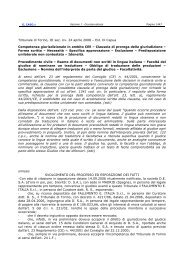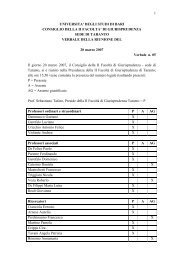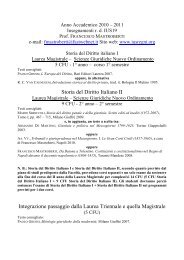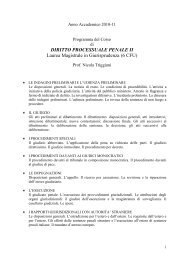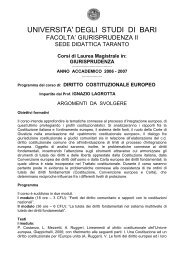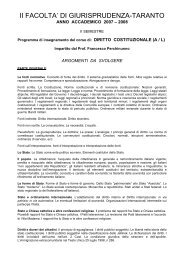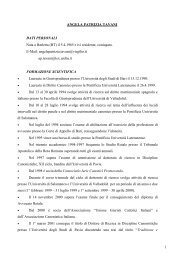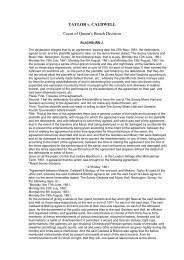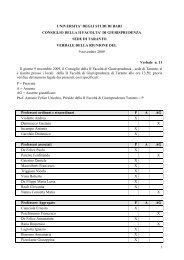TRYING CASES IN THE MEDIA: A COMPARATIVE OVERVIEW
TRYING CASES IN THE MEDIA: A COMPARATIVE OVERVIEW
TRYING CASES IN THE MEDIA: A COMPARATIVE OVERVIEW
You also want an ePaper? Increase the reach of your titles
YUMPU automatically turns print PDFs into web optimized ePapers that Google loves.
03__RESTA__CONTRACT PROOF.DOC11/18/2008 11:38:48 AMAutumn 2008] <strong>TRY<strong>IN</strong>G</strong> <strong>CASES</strong> <strong>IN</strong> <strong>THE</strong> <strong>MEDIA</strong> 59Yet reputation is not the only interest that may be infringed by an unfairmedia report. Many legal systems afford specific protection to the presumptionof innocence. According to Article 6 (2) of the European Convention of HumanRights, “everyone charged with a criminal offence shall be presumed innocentuntil proved guilty according to law.” The deduction that is generally drawnfrom this principle is that at trial the defendant is presumed innocent until guiltis proven. The European Court of Human Rights has ruled on several occasions,though, that the presumption of innocence as applied should be evenmore broadly recognized: 147 namely, every citizen has the right not to be publiclyshown as being guilty of a criminal offense before final conviction. 148Article 6 (2) of the Convention immediately binds only public authorities.However, more recently, the principle of presumption of innocence has beenapplied increasingly also to “horizontal” relationships between private parties. 149This does not imply, obviously, that an individual is entitled to be consideredinnocent by any other citizens. It rather means that when a controversy isbrought before a court, presumption of innocence should be employed as anormative parameter for the solution of the dispute and more generally for theinterpretation and implementation of private-law provisions (mittelbare Drittwirkung,or indirect effect of fundamental rights). 150This is consistent with thedoctrine of “positive obligations” of the state, developed by the EuropeanCourt of Human Rights and employed by several national courts as well. 151In this perspective, German law has been pathbreaking. German courtsstarted as early as the 1980s to widen the protection afforded by the general(English translation available at http://www.iuscomp.org/gla/statutes/StGB.htm#190).147. See Allenet de Ribemont v. France, App. No. 15175/89, Eur. Ct. H.R. (Feb. 10, 1995),http://cmiskp.echr.coe.int////tkp197/viewhbkm.asp?action=open&table=F69A27FD8FB86142BF01C1166DEA398649&key=61929&sessionId=14267304&skin=hudoc-en&attachment=true; Y.B. v. Turkey,App. Nos. 48173/99, 48319/99 Eur. Ct. H.R. (Jan. 28, 2005), http://cmiskp.echr.coe.int////tkp197/viewhbkm.asp?action=open&table=F69A27FD8FB86142BF01C1166DEA398649&key=9404&sessionId=14267541&skin=hudoc-en&attachment=true.148. See, e.g., Badinter, supra note 44, at 133, 145 (2001); Kristian Kühl, Persönlichkeitsschutz desTatverdächtigen durch die Unschuldsvermutung, in BEITRÄGE ZUM SCHUTZ DER PERSÖNLICHKEITUND IHRER SCHÖPFERISCHEN LEISTUNGEN: FESTSCHRIFT FÜR HE<strong>IN</strong>RICH HUBMANN ZUM 70,GEBURTSTAG, at 241, 246–47 (Hans Forkel & Alfons Kraft eds., 1985) (F.R.G.).149. See PETER SZCZEKALLA, DIE SOGENANNTEN GRUNDRECHTLICHEN SCHUTZPFLICHTEN IMDEUTSCHEN UND EUROPÄISCHEN RECHT 780–82 (2002) (F.R.G.); Badinter, supra note 44, at 145–46;Christoph Grabenwarter, Justiz- und Verfahrensgrundrechte, in EUROPÄISCHE GRUNDRECHTE UNDGRUNDFREIHEITEN 126, 138–39 (Dirk Ehlers ed., 2003) (F.R.G.).150. See BORNKAMM, supra note 20, at 254–55; Bornkamm, supra note 116, at 104–05; KLAUSWASSERBURG, DER SCHUTZ DER PERSÖNLICHKEIT IM RECHT DER MEDIEN 179 (1988) (F.R.G.);Kühl, supra note 148, at 248–52; Karlheinz Meyer, Grenzen der Unschuldsvermutung, in FESTSCHRIFTFÜR HERBERT TRÖNDLE ZUM 70, GEBURTSTAG 61, 63 (Hans-Heinrich Jescheck & Theo Vogler eds.,1989) (F.R.G.); Riklin & Höpfel, supra note 116, at 53–55.151. On the doctrine of positive obligations (or Schutzpflichten), see ANDREW CLAPHAM, HUMANRIGHTS OBLIGATIONS OF NON-STATE ACTORS 349 (2006); STEVEN GREER, <strong>THE</strong> EUROPEANCONVENTION ON HUMAN RIGHTS: ACHIEVEMENTS, PROBLEMS AND PROSPECTS 215 (2006); FrédéricSudre, Les ‘obligations positives’ dans la jurisprudence européenne des droits de l’homme, inPROTECT<strong>IN</strong>G HUMAN RIGHTS: <strong>THE</strong> EUROPEAN PERSPECTIVE 1359, 1361 (Paul Mahoney et al. eds.,2000). On the problems of state action and Drittwirkung in comparative perspective, see also VICKI C.JACKSON & MARK TUSHNET, <strong>COMPARATIVE</strong> CONSTITUTIONAL LAW 1413, 1414 (1999).


